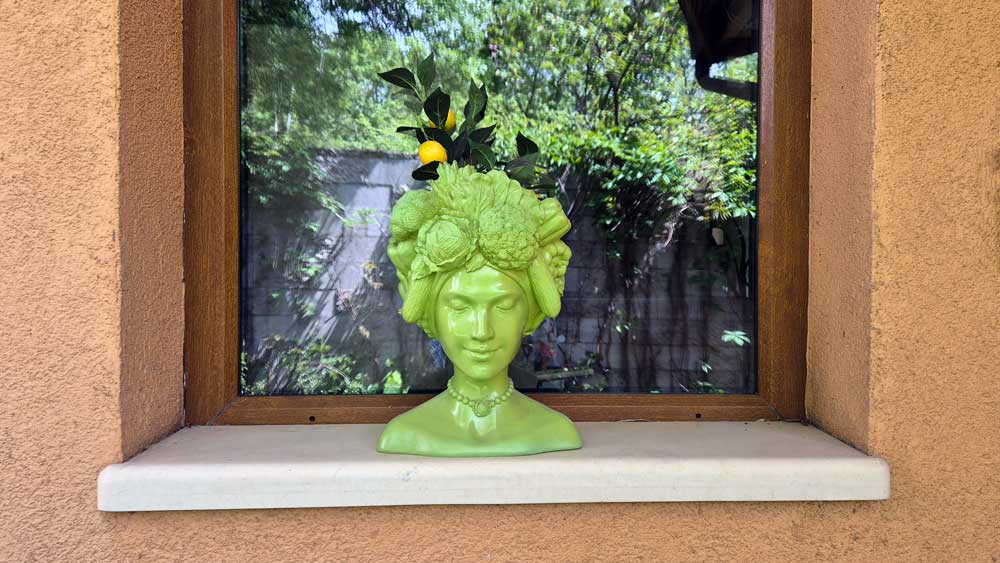Window sills are an important element of every building, not only giving the facade a finished look but also serving protective functions. Choosing the right material is crucial for the durability and appearance of the sills over time. In Bulgaria, some of the most commonly used stones for window sills are granite, marble, limestone, and travertine. Each of these stones has its unique characteristics and maintenance requirements that should be carefully considered.
Stone Selection: How Climate Affects the Material
In Bulgaria, the climate is diverse, ranging from continental in the northern and inland areas to Mediterranean in the southern regions. Therefore, the choice of stone should be aligned with the specific climate conditions of the area.
The video we will share demonstrates how quickly and easily SiloTreat Stone BE can be applied and the effect it has on the stone surface after impregnation.
Types of Stones for Window Sills
Granite
Advantages:
-
Exceptional durability: Granite is extremely resistant to freeze-thaw cycles. Its low porosity and high density make it resistant to water penetration, which is the main cause of damage during freezing.
-
Maintenance: Once properly installed, granite requires little cleaning or maintenance.
-
Resistance to temperature fluctuations: Granite does not get damaged by temperature variations.
-
Application: Suitable for window sills in regions with cold climates, where freezing is a frequent occurrence.
Disadvantages:
-
Weight: Granite is very heavy, which may cause difficulties during installation, especially for larger sills.
-
Dirt and moisture accumulation: Although granite is not porous and does not absorb moisture as much as limestone or marble, it can become wet and accumulate dirt on its surface, especially during frequent rainfall. This can lead to an unpleasant “wet” appearance and fog buildup, affecting the aesthetic of the facade if not properly protected.

2. Marble
Advantages:
-
Elegant appearance: Marble gives a luxurious and elegant look to any facade.
-
Chemical resistance: Marble is resistant to some chemicals but is not resistant to acid rain.
-
Application: Suitable for interior applications or exterior applications in regions with mild climates, where freezing is not common.
Disadvantages:
-
Absorbs moisture: Marble is more porous and less resistant to freeze-thaw cycles compared to granite. Studies show that after 204 freeze-thaw cycles, marble can undergo significant mechanical damage, including a decrease in elastic modulus from 55 GPa to 28 GPa. Its porous structure makes it vulnerable to external influences like rain and freezing, leading to changes in its color or structure, especially in regions with high humidity and frequent rainfall.
-
Requires maintenance: Marble needs to be regularly impregnated to preserve its beauty and prolong its life, preventing damage.

@freepik
3. Limestone
Advantages:
-
Pleasant, warm appearance: Limestone has a natural and warm look.
-
Easy to process: It is relatively easy to cut and shape, making it a preferred choice for more customized projects.
-
Application: Suitable for interior applications or exterior applications in regions with mild climates, where freezing is not common.
Disadvantages:
-
Porous structure: Limestone is highly porous and prone to absorbing moisture. This makes it vulnerable to damage during freeze-thaw cycles. Studies show that limestone can undergo surface spalling and a decrease in mechanical strength after multiple freeze-thaw cycles.
-
Requires frequent maintenance: Due to its porosity, it easily gets dirty and requires regular cleaning and protection.

4. Travertine
Advantages:
-
Natural beauty: Travertine has a unique, natural appearance and offers a wide variety of textures and colors.
-
Lightweight: This stone is lighter than granite and marble, making installation easier.
-
Application: Suitable for interior applications or exterior applications in regions with mild climates, provided appropriate protective measures are applied.
Disadvantages:
-
Porous material: Travertine is a porous stone that can absorb significant amounts of moisture. Without proper installation or protection, it can suffer damage during freeze-thaw cycles.
-
Maintenance: Travertine requires regular impregnation and cleaning to remain in good condition.

What Happens to Unprotected Window Sills?
Without protection, stone window sills are exposed to significant risks. Limestone and other porous stones can easily absorb water, which leads to the expansion of the pores and damage during freeze-thaw cycles. This can result in cracks, chipping, and surface deterioration over time. Additionally, marble and limestone are susceptible to staining and oxidation, which can alter their appearance and make them vulnerable to weathering. Without regular protection, the stones will wear much faster, leading to the need for more expensive repairs and replacements.

@freepik
Stone Impregnation: Protection and Longevity
Once you've chosen the right stone, it's time to protect it. Exposure to the elements can damage the stone's surface over time, leading to fading, dirt buildup, and moisture penetration.

Impregnation with SiloTreat Stone BE: A Fast and Effective Solution
How SiloTreat Stone BE Works
The natural stone impregnator SiloTreat Stone BE does not create a surface layer but reacts chemically with the pores of the material, creating surface tension that repels liquids and prevents them from penetrating deeply.
Application Process:
- Cleaning the surface: Before applying the impregnator, clean the stone from dust and dirt. This will ensure maximum penetration of the product into the pores.
-
Application: The impregnator is applied with spraying, in just one layer. The process is fast and easy, with no need for reapplication.
-
Tip: Don’t forget to protect the edges and the lower (overhanging) part of the stone. You can spread the product on these details with a regular paintbrush.
-
Drying: After application, allow the impregnator to dry (usually within 4 hours), after which the surface is protected.
 |
 |
The Effect of Impregnation
Once applied SiloTreat Stone BE, the stone becomes much more resistant to moisture and dirt. This makes the maintenance of the window sills much easier, and they retain their beauty and functionality for years.

Source:
1 Scientific Reports - www.nature.com
2 Geological Society, London





